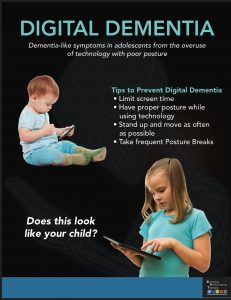Digital Dementia And 7 Tips To Help YOU and YOUR Family Avoid It Today
 Is digital dementia affecting you or your family?
Is digital dementia affecting you or your family?
The overuse of electronics at a young age is a rising concern for many doctors around the world. The demand for anything digital is at an all-time high and it’s leading to a surge in what some people are calling “digital dementia“.
In this article, we’ll help you understand the facts about digital dementia (or electronic dementia as others call it), and share research on the effects of digital devices on children. We’ll also provide seven useful tips to help avoid it, and links to other sources of information.
What is digital dementia?
Digital dementia is characterized as the deterioration of brain function as a result of the overuse of digital technology, such as computers, smart phones and Internet use in general. This excess use of technology leads to unbalanced brain development, as heavy users are more likely to overdevelop their left brains, leaving their right brains underdeveloped.
With electronic technology in almost every household today, this new kind of electrical dementia is on the rise and hitting our youth at an alarming rate.
The term ‘digital dementia’ originated in South Korea a few years ago, a country that has one of the largest digital-using populations in the world. South Korean doctors noticed young patients experiencing cognitive and memory problems after heavy use of digital devices. They also found the symptoms to be more common with people who had sustained previous brain injuries.
With the advent of computers, young people are less reliant on their brains. Intelligent computers can now do most of the thinking for them, which is leaving many young brains almost redundant. There’s also the worry that overuse of technology is causing short attention spans.
Research about digital dementia
Dr. Manfred Spitzer, a neuroscientist and psychiatrist, wrote a book in 2012 named “Digital Dementia: What We And Our Children Are Doing To Our Minds.” He is a vocal advocate against training kids with computers and electronic media. In his book, he states:
- “When you use the computer, you outsource your mental activity”
- “The more you train kids with computer games, the more attention deficit you get.”
His research shows that between 15 and 18 should be the minimum age for media consumption.
- “The more time you spend with screen media, the less your social skills will be.”
Dr. Stephen Pont, a pediatrician at Dell Children’s Medical Center comments on digital media:
- “It makes sense at the extreme that it would affect memory. We do know it can affect sleep quality.”
More on This Topic: Are You Experiencing Digital Dementia?
How to Avoid Digital Dementia For Your Teenager/Kids
There are precautions you can take to limit your child’s chances of developing electronic dementia. Below are seven useful tips.
- Limit Screen Time
The suggested screen time for children of all ages should be limited to two hours a day and no TV or digital entertainment should be permitted for children under the age of two. Homes should have “screen-free zones”, especially in bedrooms. - Use your Head Instead of Relying on Digital Devices
When possible, try to think for yourself instead of relying on your computer to do the thinking for you. - Learn a New Language
Using the brain to learn something new, like a new language, provides brain stimulation that can fend off all types of dementia. - Get Physical
Exercise is extremely important in order to keep the brain active and healthy. - Perform Brain-Based Postural Exercises
Brain-based learning refers to teaching methods, lesson designs, and school programs that are based on the latest scientific research about how the brain learns, including cognitive development—how students learn differently as they age, grow, and mature socially, emotionally, and cognitively. - Read a Real Book, Not a Kindle
Yes, reading is great stimulation for the brain, but reading from electronic devices such as a Kindle, exposes your body to electromagnetic fields which can promote electronic dementia. - Interact with Real Life
Children need to spend the majority of their time interacting with real people and real life instead of the equivalent from computer games. Make sure they regularly perform the following:
-
-
-
- Exercise
- Play outdoors
- Reading
- Enjoy hobbies
- Use their imaginations creatively
- Learn with non-electronic formats like newspapers, board games and books
- TVs should be turned off during meals to foster family time interaction
-
-
Other Tips For Parents
You can also follow these tips for extra precautions against electronic dementia.
- Do not feel pressured to introduce technology early in your child’s life
- Monitor children’s media—for example, be aware of what apps are used
- Turn off the television set and other devices when not in use—background media can distract from parent-child interaction and child play, which are both very important in child language and social-emotional development
- Keep the bedroom, mealtimes and parent-child playtimes screen-free
- Avoid exposure to devices or screens an hour before bedtime
- Avoid using media as the only way to calm your children—this can lead to problems with a child’s own ability with setting limits and managing emotions
In Summary
In this article, we learned the definition of digital dementia, the symptoms children could face and seven tips to avoid it. We hope you find this information useful and take electronic dementia as seriously as we do.
The use of electrical devices will only increase. As parents, it’s our duty to care for our children and protect them from new dangers such as digital dementia.